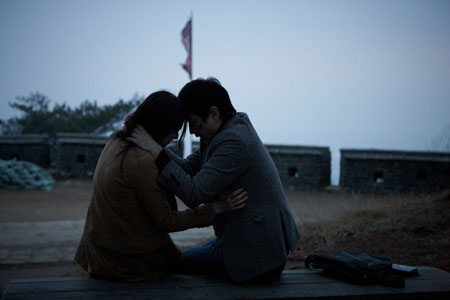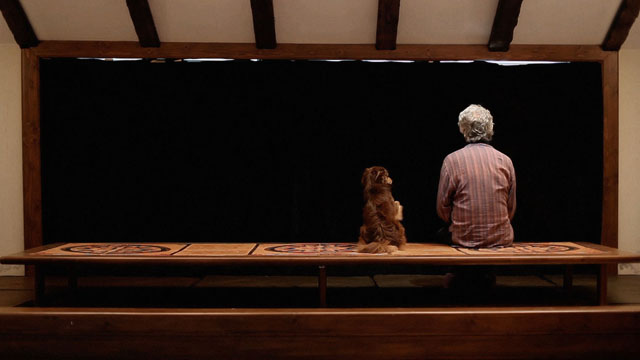In Hong Sang-soo‘s Nobody’s Daughter Haewon, an aspiring young actress falls asleep in a café in Seoul and dreams of meeting a tourist who happens to be Jane Birkin. I just love your daughter, Haewon gushes, she’s so beautiful. Birkin places her hands on Haewon’s cheeks and notes a resemblance with her daughter (neither actually speaks the name “Charlotte Gainsbourg” out loud) and jots her number down and tells her, you know, if she’s ever in Paris, do drop by. As the two women giggle and hug, instant soul mates, Haewon wakes with a jolt.
Right off the top, then, in this very first scene, Hong signals that he may be slipping us into an alternate reality at any given moment and without warning. He also flags Nobody’s Daughter Haewon as a film about women, their aspirations and the considerable powers they wield to attain them. In the inevitable drinking scene, it’s the female students at the table who guide the conversation into risky waters and back out again. When Haewon (Jung Eunchae, a relatively new face in Korean cinema, who, as Haewon, knows when and how to use her beauty, passively one moment, aggressively in those few other moments that call for quiet assertiveness) goes walking with a couple (Ye Jiwon [Hahaha] and Yu Junsang [In Another Country and The Day He Arrives]), it’s Yeonju who decides how she and her illicit lover, Jungshik, will respond to Haewon’s momentary crisis, and Jungshik who admires Yeonju’s insight into how fleeting winds are made visible.
But before the crisis, before the narrative at the heart of Hong’s new film is set in motion, Haewon will meet her mother (Kim Jaok), who is about to leave the country to live out her last years in Canada, to do whatever it is she wants to do. Every day, she tells Haewon, is a day closer to death, and Haewon, too, must do what she wants. Now. No waiting.
Easier said, etc. In another dream, Haewon readily spills her secret to a fellow student, the last person she’d want to tell. Yes, she’s having an affair with film director Seongjun (Lee Sunkyun, [Oki’s Movie]), her professor, a married man with a newborn baby, “sleeping together and everything,” as the student puts it. It’s a while into the film before the two of them fully admit to their love for each other, and it’s a rocky road leading up to and away from that exchange. In arguments, Seongjun’s the one with the clumsy outbursts, the one doing the yelling and the pleading. Early on, Haewon, in a sweater so red it practically burns through an otherwise subdued palette, wonders out loud whether she might be some sort of devil.
Is Jungwon (Kim Euisung [The Day He Arrives]) for real? Does he really give Haewon the watch he received from the president, conjure a taxi via telepathy, and suggest that he may be offering to sweep her away to San Diego, where he is—uh-oh—another professor? We live in an age, Cronenberg’s A Dangerous Method notwithstanding, in which Freud has been out of fashion for decades, but, as Nicholson Baker is currently arguing at the NYRblog, it’s high time we work dreams back into our fictions: “You can’t fight it. It happens. The dreams come on. They’re part of what we do.”
We needn’t worry about mapping one-to-one correspondences between the objects and events of our dreams with explicit messages or even vague meanings. Trying will get you only so far into Jafar Panahi’s Closed Curtain. Reality is slipperier here than in Nobody’s Daughter Haewon, with Panahi reaching wider and plumbing deeper into cinema’s innate tendency toward dream logic.
The beginning of Closed Curtain is straightforward enough. A screenwriter (Kambuzia Partovi, a filmmaker in his own right [Café Transit], who also wrote Panahi’s The Circle) and his dog—most amazing and endearing performance by an animal in who knows how long—arrive at a seaside villa. The panoramic floor-to-ceiling living room windows offer a spectacular view of the ocean, but the screenwriter will not be enjoying it. Not only does he close the curtains—all of them, throughout the house—he also hangs opaque black cloth over the windows before shaving his head to alter his appearance and settling down to work. When the dog inadvertently switches on the television by plopping down on the remote control on the sofa, we learn that the screenwriter isn’t the only refugee here: Iran’s Islamic leadership is cracking down on dog ownership, and the TV news footage is gruesome with the slaughter of these supposedly unclean pets.
The writing routine is broken by a ruckus outside, then the dreaded knock at the door. The police, presumably, give up and go away. But not a brother and sister on the run. Somehow, they’re inside. Later, the screenwriter will use his iPhone to record his version of that decisive instant. How did they get in? He narrates his every move, unlocking the door to dump the dog’s poop, but locking it again, he’s sure. When did they get in? And is he recording this testimony for his own sanity or for a future run-in with the authorities?
The brother is off, but not before warning the writer that his sister has a penchant for suicide. Later in Closed Curtain, she’ll actually pull off a suicide, taking a last, long walk into the waves, but it won’t be long afterwards before she reappears inside. When Panahi himself walks into the frame, all bets are off. Just when you’re sure the sister is some sort of ghostly spirit, neighbors show up at the front door, in full sight and earshot of a couple of seemingly sane window repairmen (another story, but who actually broke that expansive front pane?) and a landlord-type friend to ask after the brother and sister—so they must actually exist, right?
Closed Curtain is seeped in a melancholic flux of mind-wandering and rumination. The villa might be a 3D model, an architectural correlation with Panahi’s inner mind—but sometimes, a villa is just a villa. One thing we can be sure of: Jafar Panahi is being taken care of. He has friends and neighbors who pitch in when and where they can and occasionally even bring over a tempting, multi-dish dinner. Things aren’t so bad, the landlord assures him. But all of this, Panahi replies, means nothing if he cannot work. Panahi leaves no doubt that the 20-year ban on filmmaking and communicating with the world outside of Iran has led him to thoughts of putting an end to it all. But a final act, as a car is thrown into reverse, assures us that the particular period of depression that inspired Closed Curtain, has, thank heaven, passed.
Some see Closed Curtain as a lesser footnote to This Is Not a Film or as some sort of disjointed coda. The new film does pick up where the previous one left off, but it is by no means a lesser work. It is a moving, perplexing record of a period of true crisis as experienced by two close collaborators as well as a tribute to friends and neighbors who defy risk to lend a helping hand to an artist in need.
More on Closed Curtain from Giovanni Marchini Camia (Film Comment), Eric Kohn (Indiewire), Diego Lerer (in Spanish), Dennis Lim (New York Times), Lee Marshall (Screen), Jay Weissberg (Variety), Deborah Young (Hollywood Reporter), Stephanie Zacharek (Film.com), and Steven Zeitchik (Los Angeles Times).
Updates, 2/16: “Though it may lack some of the urgent potency of This Is Not a Film‘s profound implications, both political and philosophical, Jafar Panahi’s second ‘not-a-film’ is more formally sophisticated and intricate, an elegantly and movingly directed confession of the director’s declining morale,” writes Adam Cook in the Notebook.
“Someone is sure to note triumphantly that the restrictions placed upon Panahi have required him to be rigorous in his storytelling, to make more with less,” writes David D’Arcy. “I hope he doesn’t have to read that condescending nonsense.”
And back to Nobody’s Daughter Haewon: “Though Hong’s universe of film profs, drunk students, and romantic woes may seem limiting,” writes Adam Cook, “his world is nevertheless an expansive one that evolves film by film. Slight gestures are unforgettable, such as one involving an umbrella in last year’s In Another Country, and with ambiguous instances of déjà vu, overlapping scenarios, and maybe-a-dream-maybe-not moments, his cinema has become, as quietly as possible, one of mystery.”
Hong “connects moments and bits of conversation into an evanescent patchwork, one whose ideas don’t so much leap out so much as they emanate gradually,” writes Stephanie Zacharek at Film.com. “Those ideas may not have much intellectual depth, but they’re emotionally resonant—Nobody’s Daughter Haewon is a meditation on loneliness and longing in the wake of a stop-and-go love affair, an examination of the residue that’s left when two people who care for each other realize that there’s no hope for any future.”
More from Dan Fainaru (Screen) and Deborah Young (Hollywood Reporter).
Update, 2/18: For Giovanni Marchini Camia, writing for Film Comment, Nobody’s Daughter Haewon is “another quirky lo-fi affair by the prolific festival darling, albeit one too indistinct to truly resonate and unlikely to find many admirers outside of his devoted fan base.”
Updates, 1/19: David D’Arcy and Reuters’ Marcus George note that the ISNA news agency is reporting that Javad Shamaqdari, Iran’s deputy culture minister, has issued a formal protest to the organizers of the Berlinale for Panahi and Partovi’s being awarded the Silver Bear for best screenplay. Shamaqdari: “Everyone knows that making a film and sending it outside the country needs permission. Making these films is illegal, but so far the Islamic republic has shown patience towards such illegal acts.”
Meantime, writing for Time Out New York, Stephen Garrett compares Closed Curtain with This Is Not a Film: “While that uncategorizable artistic feat explored artistic oppression and spiritual freedom in vividly original ways, the surreal drama Closed Curtain actually manages to broaden and enrich those same ideas. The structure is far more oblique and enigmatic, but the payoff is arguably more haunting.”
For news and tips throughout the day every day, follow @KeyframeDaily on Twitter and/or the RSS feed. Get Keyframe Daily in your inbox by signing in at fandor.com/daily.







